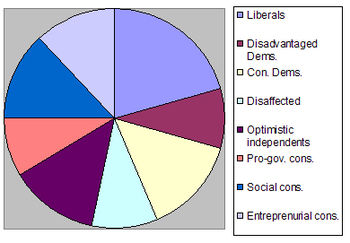 |
| Typological groups according to the Pew Research Center. (Photo credit: Wikipedia) |
A new Pew Research Center analysis
of international census and survey data finds that there is a religion
gender gap: Women generally are more religious than men by several key
measures of religious commitment, although this pattern is not universal
and can vary by religious tradition.
In some countries and faiths, men are more religious than women, at
least by some measures. For instance, among Muslims and Orthodox Jews,
men are more likely than women to attend worship services at least
weekly, the new study finds.
Religiousness also can be measured by
asking people how important religion is to them personally. In more than
half of the 84 countries surveyed (46), roughly equal shares of men and
women say that religion is “very important” to them. However, in 36
other countries, more women than men say religion is important in their
lives – and usually by wide margins. As a result, across all 84
countries, women surpass men in this aspect of religious commitment by
an average of 5 percentage points (65% vs. 60%). Only in Mozambique and
Israel do men say that religion is very important to them more often
than women do.
The biggest exception to the general
pattern of women being more religious than men occurs in weekly
attendance at worship services. Across the 81 countries where Pew
Research Center data are available for this measure, more men than women
attend worship at least once a week (48% vs. 42%).
This attendance gap is largely driven by
27 countries in the survey with large Muslim populations. In many
Islamic societies, men are expected to attend communal Friday worship
services in the mosque, while women can fulfill this obligation either
inside or outside the mosque. There are similar religious norms
regarding worship attendance among Orthodox Jews in Israel. As a result,
men in these 28 countries report far greater rates of attendance than
women, often by margins of at least 20 percentage points.
By contrast, in countries that have large
Christian populations (30 of the 81 studied on this measure), women are
more likely to report attending services weekly. And in 23 other
countries, men and women report attending about equally.
In 47 of the 63 countries (75%), men and women are about equally likely to profess a belief in heaven. Women are more likely to believe in heaven in 15 countries, often by margins of 5 percentage points or more.
Men and women in 52 of 63 countries (83%) are about equally likely to say they believe in hell. Women hold this belief more than men in 10 countries, while men surpass women in this belief in Lebanon. Overall, when the 63 countries are taken together, an average of 81% of women and 80% of men believe in hell.
Across all 63 countries, a greater share of women than men believe in angels by an average gap of 3 percentage points.
Looking at Christians only, there are just a handful of countries where the genders differ significantly in their beliefs in these concepts. A larger share of Christian men believe in heaven in only one country (Lebanon); Christian men are more likely than Christian women to believe in hell in two countries (the United States and Lebanon) and to believe in angels in one country (Zambia). On the other hand, more Christian women than Christian men profess belief in heaven in five countries (Russia, Bosnia-Herzegovina, Chile, Botswana and the United States), in hell in four countries (Kazakhstan, Russia, Bosnia-Herzegovina and Chile) and in angels in nine countries (Kazakhstan, Russia, Uruguay, Bosnia-Herzegovina, Chile, Argentina, Ecuador, Uganda and Guatemala).










No comments:
Post a Comment